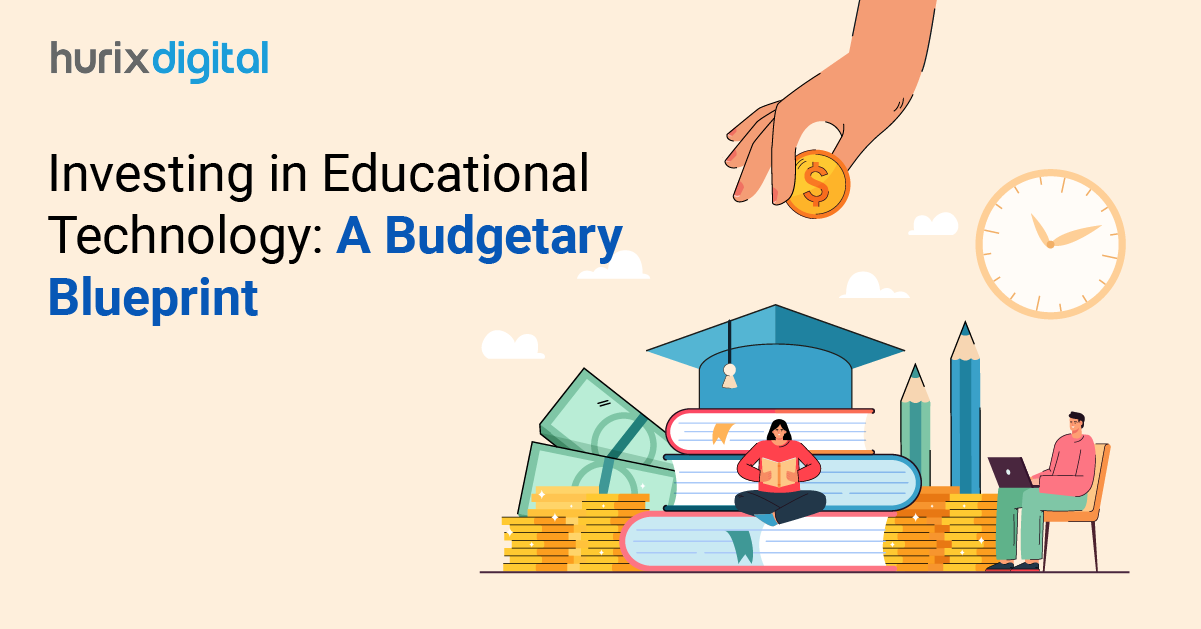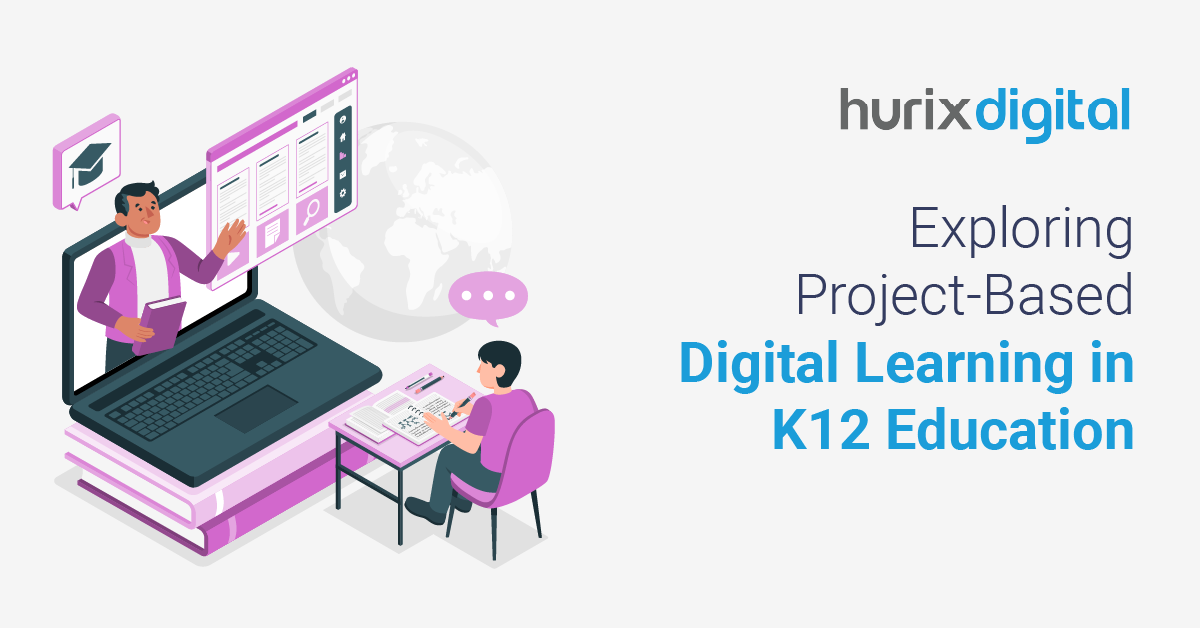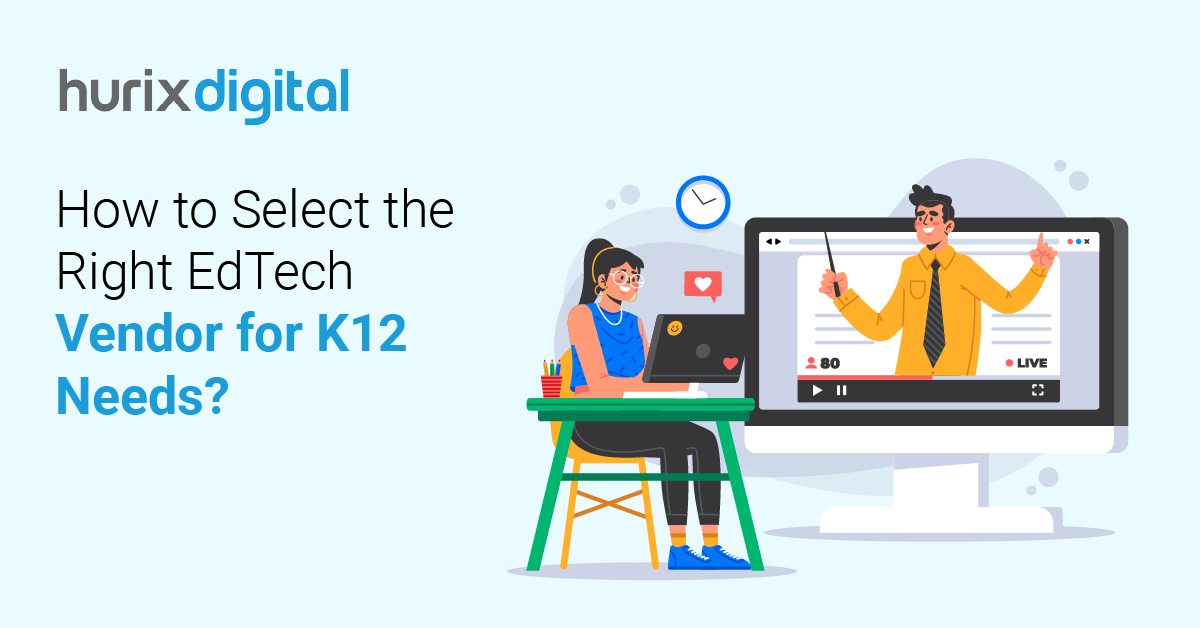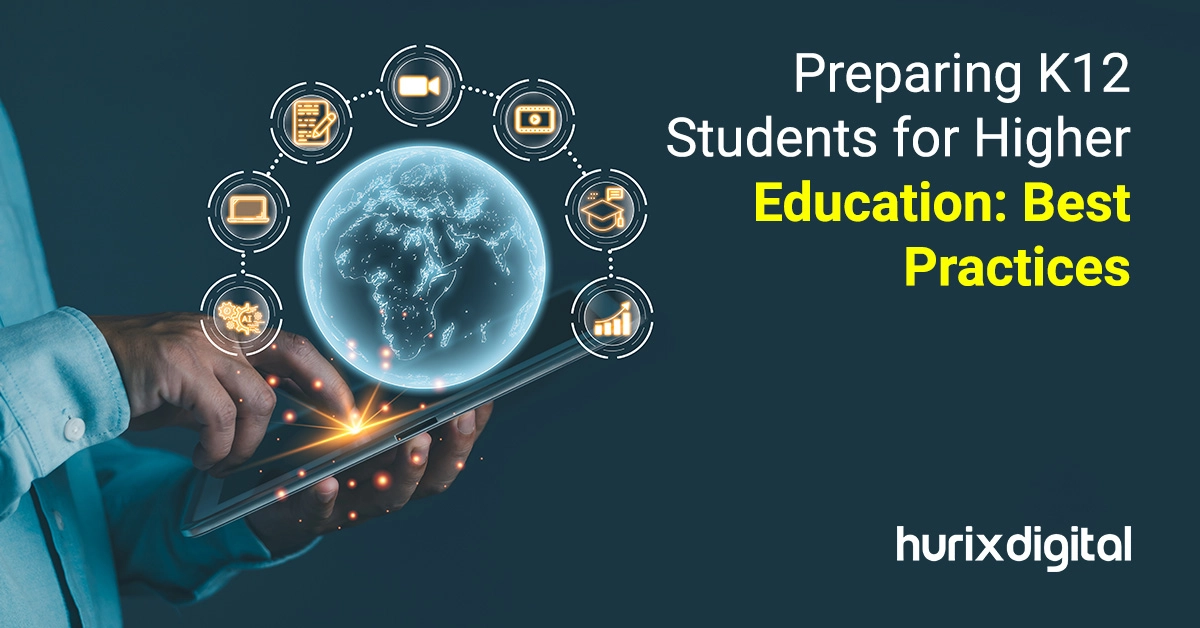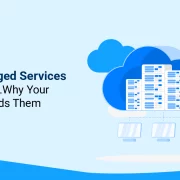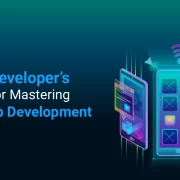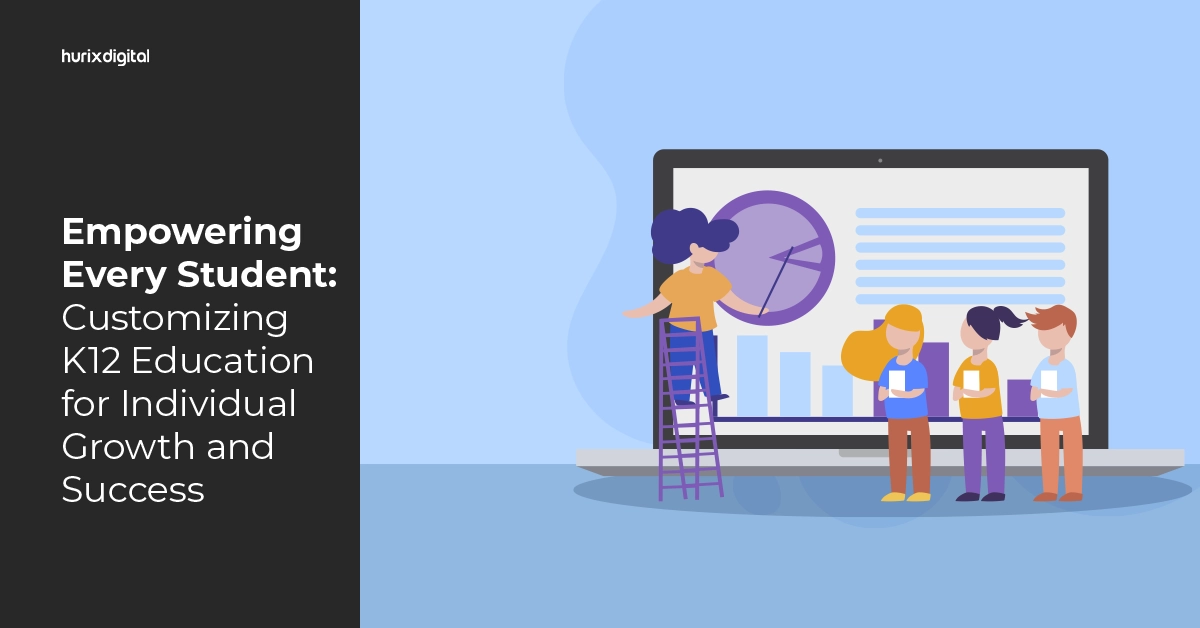
Empowering Every Student: Customizing K12 Education for Individual Growth and Success
Education, integral to society’s development, provides people with the opportunity, knowledge, and skills to perform assorted roles in life. Nevertheless, in an era when the traditional approach to education, which means one size fits all, is considered insufficient and inappropriate to the current situation, implementing a personalized learning method in K12 education is becoming increasingly imperative.
This reform acknowledges the fact that all children have different learning styles, and every kid can be a quick or slow mover. It also aims to provide individualized instruction that will help each student succeed.
This article examines the value of customization in K12 education and the elements of this strategy, their difficulties, and effective implementation techniques.
Table of Contents:
- Why is Personalization Necessary in K12 Education?
- The Role of Content in Personalized Learning
- Elements of K12 Education
- Customizing the K12 Curriculum: Approaches
- Overcoming Implementation Challenges
- The Value of Customizing K12 Education at the Elementary and Secondary Level
- Evolving Roles of Teachers
- Delivering Customized Curriculum Through K12 Online Learning
- Personalization Through Technology
- Transforming K12 Learning with Hurix Digital
Why is Personalization Necessary in K12 Education?
The process of individualized learning begins with the inadequacies of the conventional instructional model, which does not consider learners’ personal needs. In K12 education, personalization ensures that learning routes are tailored to students’ strengths and aptitudes, thus raising motivation, relevance, and engagement levels. This method is essential for creating a link between the student and the subject matter, which makes learning engaging and efficient.
The Role of Content in Personalized Learning
Personalization is more individualized and made possible by integrated courses within the K12 curriculum. Concerning personalized learning, K12 content should be diverse, attractive, and flexible, referring to various students’ learning styles and levels. Leaders of the educational content provide students with K12 course material that is modular, interactive, and multimedia compared to previous forms. Tailoring the content to the specific needs of each student in terms of their education goals and areas of interest.
- Customized K12 Education
Customization in K12 learning involves adapting educational strategies, content, and pacing to fit the unique needs of each student. This strategy merges advanced teaching methods, diverse K12 materials, and flexible technology.
- Customizing the K12 Curriculum
A K12 curriculum tailored to different learning modes of students is critically important for meeting their personal needs and interests. The mix of subjects, the interdisciplinary approaches, and the project-based activities can improve the education process and effectiveness. The basis of this idea is that the learning process is relevant, authentic, and linked to real-world experience, which makes education more beneficial and attractive for students.
Also Read: 3 Tips for Introducing Competency-Based Learning into K12
Elements of K12 Education
Key components include:
- Personalized Learning Paths: Designing individual education paths should be underpinned by knowledge of every student’s skills, weaknesses, interests, and how they process the information. Learning technologies and AI platforms allow students to get their feedback in real time and thus learn with personalized materials.
- Blended Learning Environments: Using blended learning, students acquire knowledge not only through the classical instruction system but also by using online digital media so that they can regulate their speed and direction of learning. This way of merging K12 online platforms brings synchronous and asynchronous learning to the forefront.
- Embracing Ed-Tech Solutions: Imovently, K12 ed-tech companies develop the most cutting-edge products that help create individualized learning models. These technologies, which comprise AI for K12 education and also gamification, elevate the task of learning to involve and become available to pupils.
- Curriculum Flexibility: A flexible K12 curriculum must adjust for different types of learning and speed to be effective. The curriculum should also incorporate diverse subject offerings such as STEAM, coding, digital literacy, and soft skills training to provide students with multiple avenues to explore their passions and discover their competencies.
- Continuous Assessment and Feedback: Frequent evaluation and individual feedback enable monitoring of student progress, indicating the parts that require attention and initiating alteration of the learning trails. This approach is the one that will undoubtedly keep students engaged with and dedicated to learning.
- Curriculum Adaptation for the 21st Century: A tailored learning plan responds rapidly, incorporating standard academic disciplines alongside other competencies necessary in 21st-century living, such as digital literacy, critical thinking, and problem-solving. The advantage is that it also stresses the benefits of many options as students go deep into their areas of interest and obtain the skills necessary for their future professions.
Customizing the K12 Curriculum: Approaches
Integrating creative teaching methods with the standard K12 curriculum updates the learning experience and greatly improves it. Study-based learning, which takes students to tackle real-life issues, provides a good platform for linking theory with practical experience. While flipped classrooms maximize technology to engage students in at-home lectures during class, the class sessions are transformed into interactive problem-solving.
In addition, gamification incorporates game aspects into learning to keep the students entertained and raise their competence. Altogether, these strategies are to improve the outcome of professional development in terms of more lively and efficient learning.
Overcoming Implementation Challenges
Several challenges, including the scalability of customized learning models, thorough teacher preparation, and equal access to technology, are necessary to personalize K12 education. Strategies for addressing these challenges include
- Investing in Scalable Ed-Tech: Adapting K12 online learning platforms for large-scale use is crucial for successfully implementing personalized learning.
- Professional Development: Enabling teachers with continuous training and proper materials in individualized instruction techniques is imperative as it provides accurate, personalized education.
- Bridging the Digital Divide: A concerted attempt to offer all students a chance to use digital devices and the internet is necessary to ensure that personalized K12 learning is equitable.
The Value of Customizing K12 Education at the Elementary and Secondary Level
Individualized K12 teaching not only enhances educational results but also improves the general welfare of the learners. It helps develop those essential traits such as imagination, flexibility, and critical thinking that will serve them in the highly complex world.
Evolving Roles of Teachers
In personalized learning environments, the role of the teachers changes drastically, and as a result, it helps the individual success and growth of the students. Students’ learning process is shaped by their instructors, who use a range of K12 solutions to help students explore educational paths of their own choice. Tutors act as both coaches and mentors, so they can give each student what they need, including advice and feedback necessary to succeed. Also, they serve as resource curators who select and organize K12 content materials to catch students’ ideas and individuals’ unique learning styles.
Teachers also have data analysts running, and they analyze data from the K -12 online learning platforms and assessments, which helps them customize teaching approaches according to the student’s needs. In meeting this delicate goal, we endeavor to make the school a living space that accommodates every learner’s needs and permits them to blossom.
Delivering Customized Curriculum Through K12 Online Learning
A customized curriculum requires an advanced infrastructure supporting K12 online learning and K12 content delivery. K12 ed-tech companies are at the forefront, developing platforms facilitating access to personalized learning experiences. These platforms are instrumental in providing students with customized materials, interactive activities, and immediate feedback, thus making personalized education a scalable and practical approach in modern classrooms.
Personalization Through Technology
- Adaptive Learning Platforms: On the other hand, these platforms utilize AI in K12 education to update material on the fly and provide individual learning tailored to each student.
- Interactive Online Resources: With multimedia K12 content inclusion, these sources can match various learning styles, which helps every student engage in a method that best suits their way of learning.
- Ensuring Effective Learning Outcomes: The strategic implementation of K12 online learning platforms guarantees that the delivery of customized curricula is efficient and engaging, meeting each learner’s unique needs.
Also Read: Beyond the Classroom: The Importance of Extracurricular Activities in K-12 Education
Transforming K12 Learning with Hurix Digital
The experience of the entirely customized K12 learning system is the most challenging part of the evolution but is indispensable for the development of education. By integrating technology, creative curriculum design, and teacher education, we can establish a learning context that meets students’ academic requirements and promotes their all-round development and achievement. Creating personalized curricula and employing up-to-date K12 ed-tech makes it feasible to fashion an educational system in which each child is prepared to reach their capacity.
Hurix Digital, which offers state-of-the-art K12 solutions and collaborates with K12 eLearning companies, is at the forefront of this revolutionary change. Our dedication to providing cutting-edge K12 content and technological solutions makes us the perfect partner for educators and organizations looking to customize instruction and encourage a passion for learning in each student. Discover how Hurix Digital can enable you to transform K12 learning while guaranteeing the success and progress of every student.
Get in touch with Hurix Digital to know more.

Senior Vice President – Business Development
Over 25 years of experience in the edtech and workforce learning industry with strong skills in Business Development, Customer Relationship Management (CRM) and Strategy.
